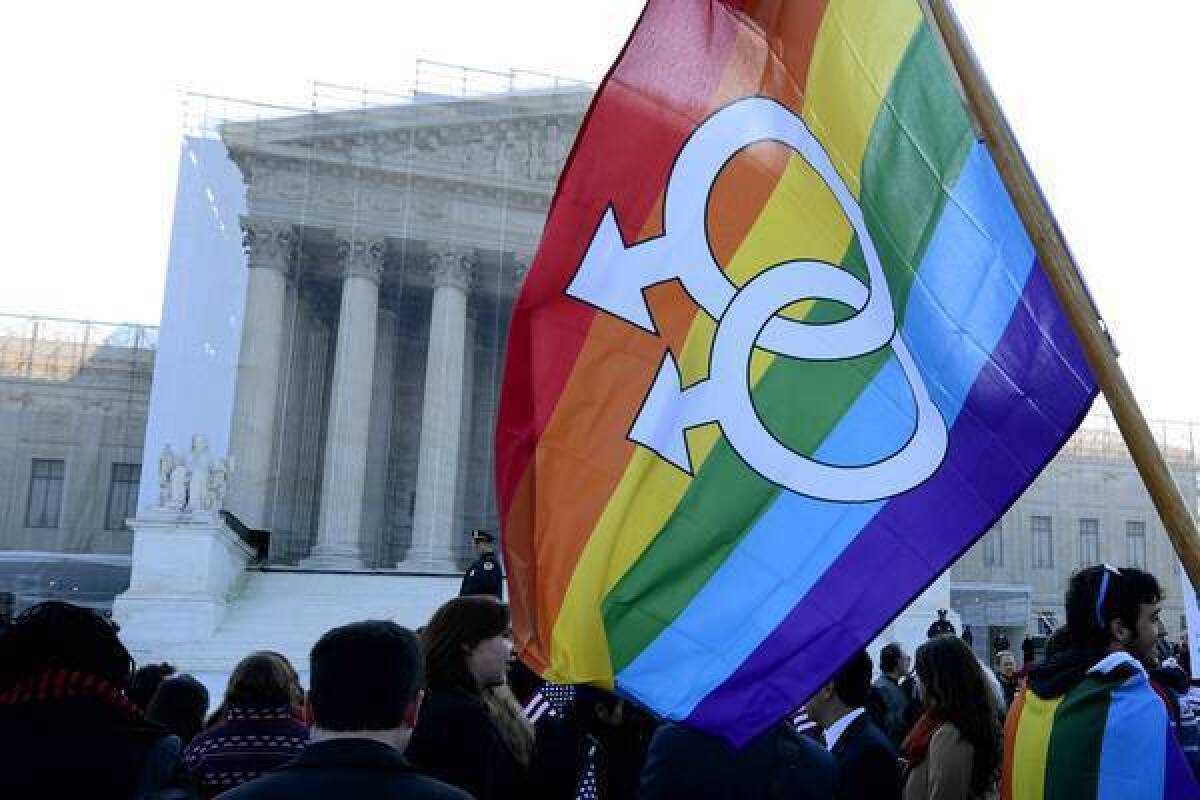Fathers, mothers and same-sex marriage

Responding to Harvard Law School professor Michael Klarman’s Op-Ed article Sunday — comparing public backlashes to past Supreme Court cases such as Roe vs. Wade to what might happen if the justices rule in favor of same-sex marriage — reader Gwendolyn Wyne of Los Angeles wrote in a letter published Wednesday:
“It is incredible to suggest that the effect of legalizing same-sex marriage is only ‘abstract and long term.’ A normal response to someone who says ‘I grew up without a mother’ or ‘I grew up without a father’ is to say, ‘I’m so sorry.’ Legalizing same-sex marriage would celebrate motherlessness and fatherlessness.
“If the Supreme Court redefines marriage, we will tell ourselves and every child that women are replaceable and men don’t matter. There is nothing more fundamentally equal than marriage as it always has been: You must have a man, and you must have a woman.”
Michael Klarman responds:
I would like to say three things in response to the points Wyne raised in her thoughtful letter.
First, I would hope that our response upon learning that a child had lost a parent would be one of sympathy, regardless of whether that parent was male or female, gay or straight.
Second, I fail to see why “legalizing same-sex marriage would celebrate motherlessness and fatherlessness.” The fact of the matter is that California and most other states permit gay and lesbian couples to adopt children or to reproduce them through surrogacy, artificial insemination or in-vitro fertilization. Once a state has made the choice to allow same-sex couples to raise children, how can it possibly benefit those children to deny their parents the right to be married?
Third, the point of my opinion piece was to speculate on the possible backlash effect that a broad ruling in favor of marriage equality in the Hollingsworth vs. Perry case might have.
One of my principal points was that a decision overturning Proposition 8 was unlikely to generate the sort of political resistance ignited by other landmark rulings such as Brown vs. Board of Education (the 1954 decision that ordered the desegregation of schools) and Roe vs. Wade (the 1973 ruling that established a woman’s right to an abortion) because its impact on opponents would be more abstract and indirect. Southern whites who opposed Brown fiercely resisted the notion of sending their children to school with African Americans. To this day, critics of Roe regard abortion as murder.
But life will not change in any analogously direct way for opponents of same-sex marriage when the openly gay couple down the street becomes eligible for a marriage license.
Even if Wyne is right — and I do not believe she is — that one effect of legalizing same-sex marriage will ultimately be to change traditional gender norms that emphasize the importance of differences between mothers and fathers, this is the sort of shift that occurs across generations. It is not the kind of direct, immediate impact that is necessary to mobilize opponents of a court ruling to undertake extraordinary resistance measures.
ALSO:
Letters: Pros and cons of public prayer
Letters: Backing down from the bullet train
More to Read
A cure for the common opinion
Get thought-provoking perspectives with our weekly newsletter.
You may occasionally receive promotional content from the Los Angeles Times.









